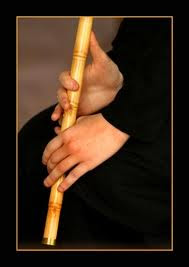Tuesday 4 September 2012
We are Playing a Symphony
A sound of Kun created everything and another sound (sound of horn) will destroy everything that was created.
What is Rhythm? It’s an interval between two sounds. What is Life an interval between two heartbeats? So we can say sound is the basic denominator of our life?
I feel that between the first sound of Kun and the second sound of horn is the interval where lies symphony of creation, a music that all creation is playing as a grand orchestra. In this grand orchestra is participating this ever expanding universe along with the majestically glowing sun, the glorious cool moon, the towering iced mountains, the deep flowing oceans, the tantalizing warm deserts, swaying trees in the woods, the elegantly flying birds, the roaring beasts in the jungle, an infant sucking his thumb in lap of her mother, a father escorting his daughter to an open air school in a village under Bo tree, a peasant plowing wheat fields, a laborer milling a machine, a scientist examining the big bang theory, a woman milking a cow, a young man in silicon valley developing a software, an artist lighting up a canvas with rapid brush strokes and much much more….
We humans a unique part of this symphony are the only creation assured to survive once this symphony ends, but the rewards on our resurrection depends on the merits of the symphony that we have played. The merit in music is simple! Were we in harmony with others when we played our music or not? On answer to this depends our next Life.
Labels:
creation,
Kun,
Meaning of Life,
Music,
Organic Unity,
Symphony,
The Day of Judgment,
Unity,
Universe
Saturday 1 September 2012
The Classic/Higher and the Popular
There was a time not too long ago when we knew no dichotomy between the Classics and the Popular, and our literature and arts had no such divisions. Our popular literature and cinema was as literary and sometimes even more than the main stream literature of the times. The readers and the cinema going public were less literate than what is today’s audience but somehow they were more educated and appreciative because the arts of that time were not subjected to Classic/Popular or Higher/Popular art distinction.
From that period I would like to bring a memorable song that was exceptionally melodious, popular and enriching because its roots were energized by the classic and eternal spirit of Maulana Jalaluddin Rumi.
See these opening verse of Masnavi:
Following is a translation of first 11 verses of Masnavi Manavi:
1) Listen to this Ney (the reed-flute) that is complaining and narrating the story of separation.
2) Ever since they (the people) have plucked me from the reedland, my laments have driven men and women to deep sorrow.
3) I want someone with chest (heart) pierced by abandonment so that I may tell him about the pain of my longing.
4) He who falls aloof from his origin seeks an opportunity to find it again.
5) I am mournful in all sorts of company and sought by the happy as well as by the unhappy.
6) Everyone becomes a friend with me according to his faculty of perception and many do not seek my inner secret.
7) My secret is not distant from my cries, but physical eyes and ears do not possess the light (to see it).
8) (In fact) the body from the spirit and the spirit from the body are not concealed, yet none (not many) are allowed to see it.
9) The sound of Ney is fire and it is not the ordinary wind but he who does not have this fire may he become non-existent.
10) It is the fire of Divine Love that has entered the Ney, it is the yearning for love that has bought the wine into action.
11) The Ney is a friend with anyone who has been deserted, and its musical divisions have torn off veils too.
This extra ordinary example of flute and flute reed by Rumi traveled in our times to our film music and this unique sensibility got beautifully translated in the one of the most popular songs of Pakistani music. The film was Heer Ranjha(1970) songwriter was Ahmed Rahi, musical arrangement was done by Khawaja Khurshid Anwar and melody was rendered by Noor Jehan. This song in Panjabi is like this:
سن ونجلی دی مٹھری تان وے
میں تاں ھو ھو گئی قربان وے
ونجلی دی تان وچ روح میری بول دی
عمراں دے کججے ھوئے بھید پیئے کھول دی
ساڈی ازلاں دی جان پہچان وے
میں تاں ھو ھو گئی قربان وے
دونوں پاسے چڑھی اے جوانی والی رت وے
جند ساڑی اک ھوی پاوں دو بت وے
مینوں اپنے تو وکھری نا جان وے
میں تان ھو ھو گئی قربان وے
The Translation:
After listening to melodious sweet sound of the flute
I have given up everything O beloved
In the sound of this flute speaks my spirit
Speak and unveil the secrets that were shrouded for ages
Of our eternal acquaintance and bondage.
I have given up everything O beloved
On both sides is cast the spell of the youth's spring
We are two in bodies but a singularity of spirit,
Don't think of me as someone separate from yourself
I have given up everything O beloved
The higher and popular arts is now an old terminology ever since Khurram Ali Shafiqu's brilliant term Consensus Arts/Literature changed this landscape. I dedicate this post to him as a token of my appreciation.
Subscribe to:
Posts (Atom)

